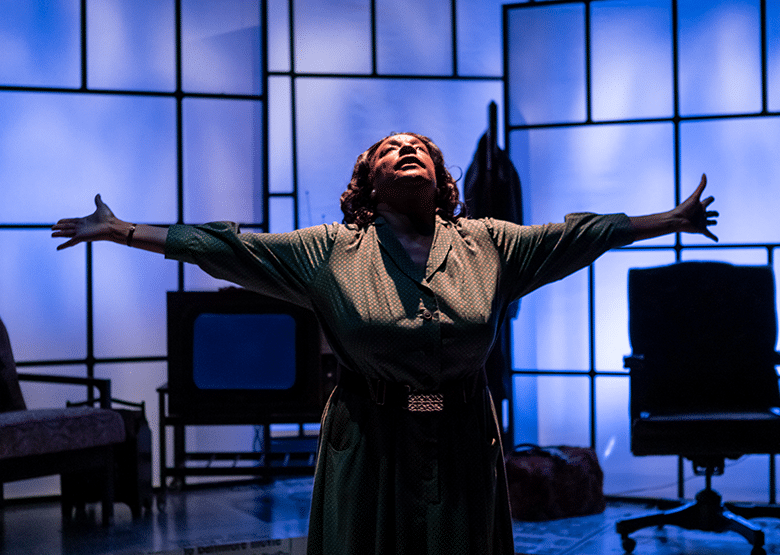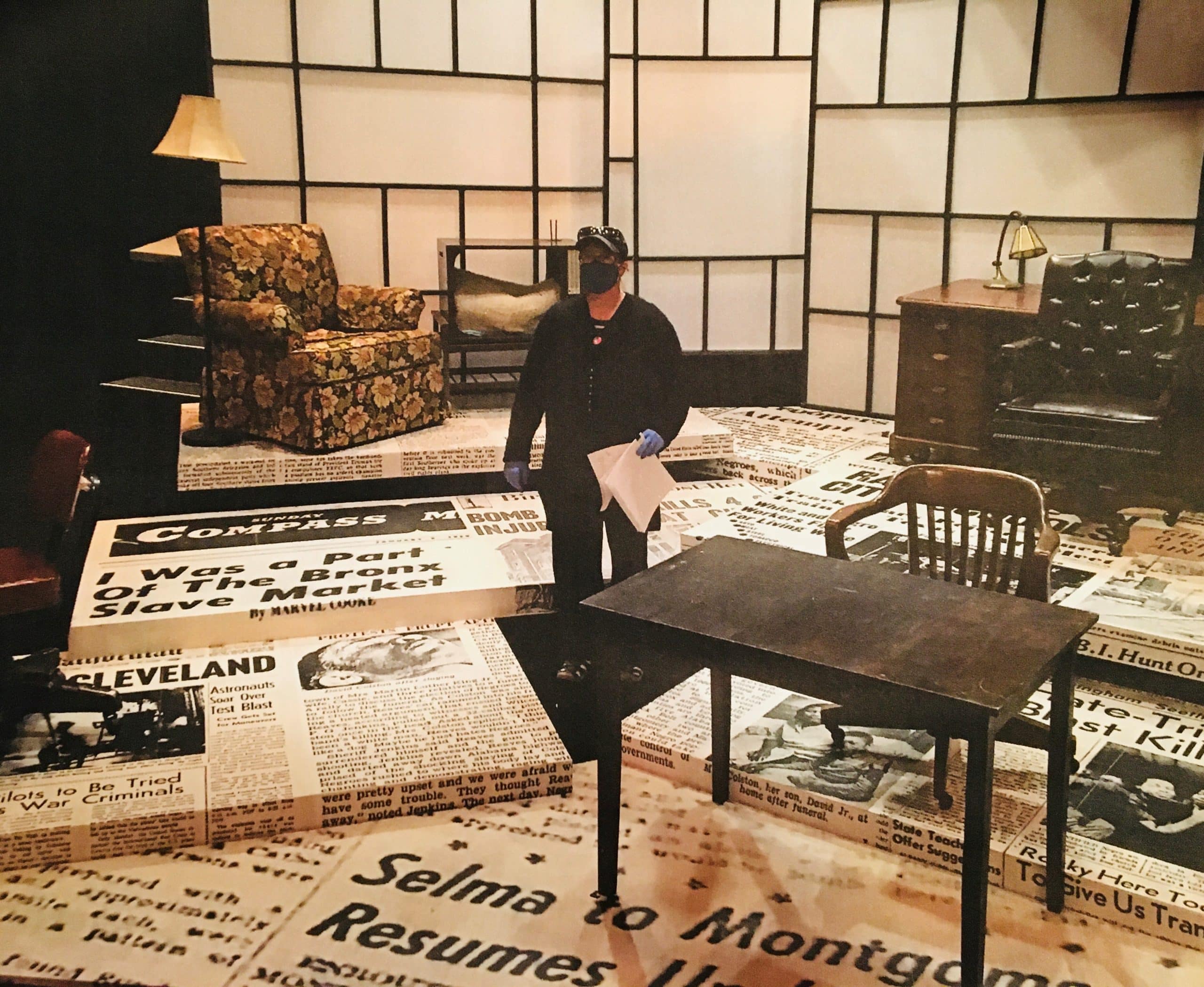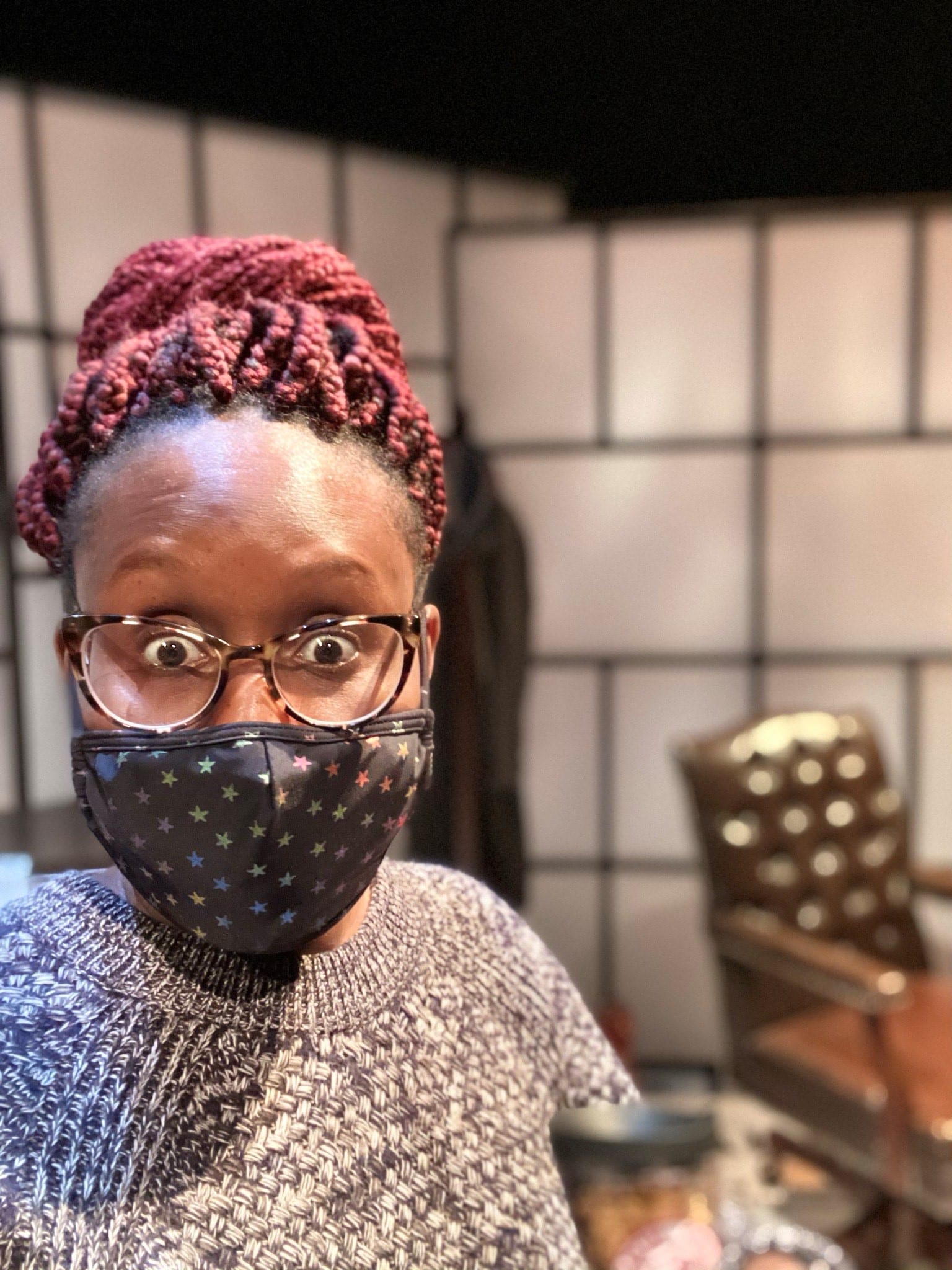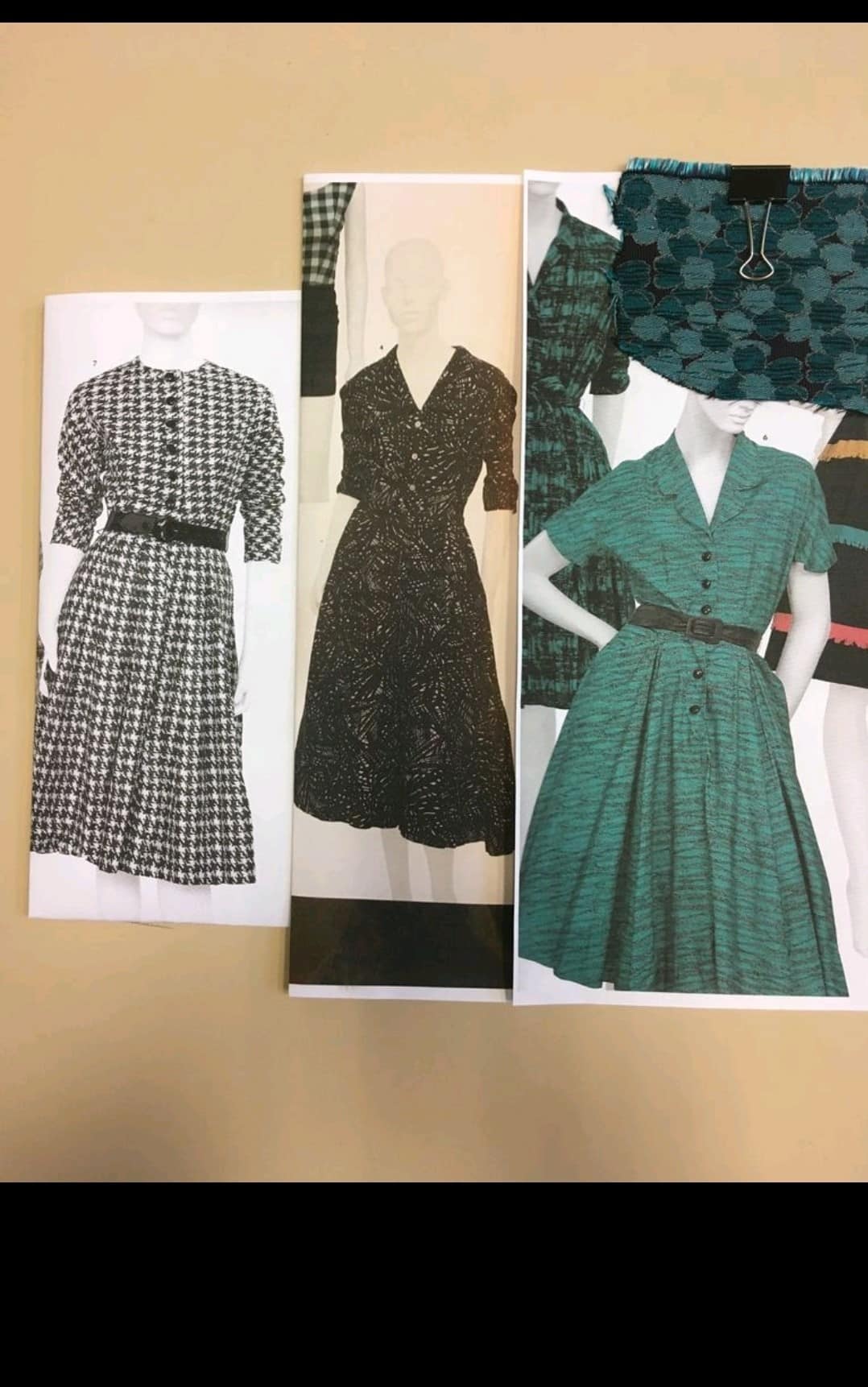As a playwright, I write to answer big questions about the world and explore the human condition. I love working in collaboration with other theatre artists and practitioners. I rely on actors, directors, designers, and stage managers to help bring the play to life. As part of our relaunch of Edges of Time, I had the opportunity to speak to the artistic and production team. In these interviews, you will hear from my brilliant colleagues and learn about what drew them to the theatre, what inspired them about working on the play, and what advice they have for emerging theatre artists. I hope you enjoy reading them as much as I did! – Jacqueline E. Lawton (Playwright), Edges of Time
McKay Coble, Set Designer | Kathryn Hunter-Williams, Actor
Jules Odendahl-James, Director | Lormarev Jones, Dramaturg
Bobbi Owen, Costume Designer | Kathy A. Perkins, Lighting Designer
Elizabeth Ray, Stage Manager | Brandon Reed, Sound Designer
 McKay Coble, Set Designer
McKay Coble, Set Designer
First, what was your role on the production and what led you into this field?
Scenic Designer. Fell in love with it in our current scene shop when I was an undergrad at UNC. Stayed for Grad school then went and had a career- then came back to teach it. 35 years
Next, what is the first play or musical you ever saw, and what impact did it have on you?
First play I SAW because I was supposed to be in it was in Chapel Hill’s Mrs. Babgy’s dance school recital. I was a fall leaf but was terrified when it came time to enter the stage. My mother didn’t force me so I sat with her and watched the show.
What excited you about working on Edges of Time?
Totally new story- I had never heard of Marvel. Working with all women. Working with my company colleagues.
What is one thing you hope audiences walk away thinking about after watching the play?
What else did they not tell us in school??? I never heard of the Japanese internment camps in the US until I was OUT of college!
Finally, what advice would you share with an early career theatre artist?
Try all aspects of making theatre. You never know what might capture your heart and mind.
 Kathryn Hunter-Williams, Actor
Kathryn Hunter-Williams, Actor
First, what was your role on the production and what led you into this field?
Actor-I couldn’t do anything else! Sometimes I think theater chose me. I truly believe that theater can be a force for positive change in the world.
Next, what is the first play or musical you ever saw, and what impact did it have on you?
Hansel and Gretel at Roosevelt high school in Washington DC, and I thought it was magic. The costumes were so pretty!
What excited you about working on Edges of Time?
Telling the story of a pioneering black woman journalist was near and dear to my heart. My mother and father were both journalists who worked for the negro press. They met at the Norfolk Journal and Guide. I was also excited to work on a new play.
What is one thing you hope audiences walk away thinking about after watching the play?
I hope audiences learn about this incredible pioneer. This black woman who spoke truth to power and fought for her community. I was amazed that I’d never heard of her before Jacqueline told me about her life.
Finally, what advice would you share with an early career theatre artist?
Stay curious, read and be kind.
 Jules Odendahl-James, Director
Jules Odendahl-James, Director
First, what was your role on the production and what led you into this field?
I actually had two roles on Edges. I began as the dramaturg and then moved into the director’s chair when the pandemic transformed the timing of the production. I’ve been a director and dramaturg for my entire career, moving back and forth between those roles depending on the project. At PlayMakers, I’ve mostly worked on projects as a dramaturg. As a director, I always dive deeply into the text to bring the world of the play to life. And as a dramaturg on new plays, I get to work with the playwright on the words which are the foundation of the world. One role’s skills help the other and vice-versa.
Next, what is the first play or musical you ever saw, and what impact did it have on you?
I remember watching my mother audition for a production of The Music Man and then seeing her in the production at our community theater. I think I was about 7 and just from watching at a few rehearsals and seeing the show, I managed to memorize every song and sang them every chance I got (and not just the ones for the children characters!). My parents also had the Time Life American Musicals boxed records(!) set of original Broadway recordings of musicals packaged by artists: Lerner & Lowe, Rogers & Hammerstein, Rogers & Hart, Jule Styne, Frank Loesser, Irving Berlin …I played those “on repeat” and knew every lyric by heart, putting on a lot of solo shows in the basement of our home. The idea that one felt things with such magnitude one had to express it in song and dance really clicked with me. I was a singer and a dancer…musicals helped me put a story around those expressions and I was hooked!
What excited you about working on Edges of Time?
I am always excited to work with Jacqueline, so that’s a given. What is particularly exciting is her investment and skill in bringing to life the stories of people whose actions and choices make history possible. These aren’t necessarily the figures whose stories you already know but the people who live in the footnotes of history, showing up for the daily work needed to change the world. In this case, Marvel Cooke, is a name you might find in American journalism chronicles but only briefly. Even she downplayed her significance. But Jacqueline takes that footnote and digs deeper, finding a long life (almost 100 years!) filled with complexity, a sixth sense about exposing injustice, and an insistent ability to make change at the ground floor level.
What is one thing you hope audiences walk away thinking about after watching the play?
How much the news landscape, particularly the local news landscape, has shrunk in America and the implications of that on civic life and public information. Also, how much the questions Marvel’s asking in 1963 seem so relevant to 2021. How does the lack of inclusion and equity in our newsrooms affect what we learn about our communities, about key issues of importance: health, education, politics? And how quickly, without a robust, free, and diverse press, might we find ourselves at risk of manipulation and misinformation by powerful entities: corporations, institutions, even the government itself.
Finally, what advice would you share with an early career theatre artist?
Get involved (or maintain involvement) in a non-arts civic organization. Learn about collaboration and social action outside of making theatre. Such an investment will more deeply root the art you make in your complex experience as a community member.
 Lormarev Jones, Dramaturg
Lormarev Jones, Dramaturg
First, what was your role on the production and what led you into this field?
I was the assistant director and made a short dance piece for Kathy. Whoopi Goldberg led me into this field. I saw Whoopi on Broadway and that impressed on me hard. I wouldn’t know how much until later.
Next, what is the first play or musical you ever saw, and what impact did it have on you?
Saw Beauty and the Beast on Broadway. Knew I wanted to be a singer.
What excited you about working on Edges of Time?
Kathy Williams and Jacqueline Lawton. We are not worthy.
What is one thing you hope audiences walk away thinking about after watching the play?
A sense of how immediate history actually is – there’s always the “the civil rights movement was so long ago!” argument. It wasn’t! There are still black people alive that lived through that. Also, labor movements – I’m obsessed with labor movements.
Finally, what advice would you share with an early career theatre artist?
Learn how to do everything in theatre. You will probably not be good at everything but you will have a foundational understanding and a better appreciation for the labor of your fellow collaborators. Knowing their craft helps you better communicate with them.
 Bobbi Owen, Costume Designer
Bobbi Owen, Costume Designer
First, what was your role on the production and what led you into this field?
I was costume designer for Edges of Time. I started designing when I was an undergraduate student at the University of Wisconsin – Madison thinking I was going to be a high school English teacher and would need some background – but fell in love with it and continued (and was probably not well suited to being a high school teacher, anyway).
Next, what is the first play or musical you ever saw, and what impact did it have on you?
You Can’t take it With You produced by the Wisconsin Players on the University campus. I was in the 7th grade in DeForest, WI and we went by bus to see the production. You Can’t take it With You is also the first production by a professional theatre that I ever saw – at the Milwaukee Repertory Theatre and I got to design it myself for PlayMakers in 1979 (and would have designed it again in 2020-2021 except for the pandemic)!
What excited you about working on Edges of Time?
Lots of answers: A world premiere. Working closely with Jacqueline and Kathy Williams. Designing a dress from the early 1960s which helped set the time and place and tell the story.
What is one thing you hope audiences walk away thinking about after watching the play?
How is it possible I never heard of Marvel until now? Who else is lost to history – and will Jacqueline tell us their stories as well?
Finally, what advice would you share with an early career theatre artist?
The best reason to pursue a career in the theatre is because you “can’t not” do so.
 Kathy A. Perkins, Lighting Designer
Kathy A. Perkins, Lighting Designer
First, what was your role on the production and what led you into this field?
I was the lighting designer. I went to Howard University in Washington, D.C. thinking I wanted to be an actress. During my Freshman year I was working on the lighting crew on a play by Alice Childress. The master electrician for the show was a good friend of mine, who was a sophomore majoring in communications. One day, while sitting backstage, he asked what I was going to do with a BFA in acting as a Black woman? (This was in the 1970s) I told him I was planning to go to Broadway. He smiled and suggested I try lighting as there was a desperate need for more Blacks behind the scenes. He convinced me and the rest is history.
Next, what is the first play or musical you ever saw, and what impact did it have on you?
I really don’t remember my first play, but it was probably one of the many plays I performed in at church. The one play that really stands out was James Baldwin’s The Amen Corner, which I performed while in junior high, for one of the Civil Rights organizations I was active with. In addition to this play, we spent a lot of time discussing Baldwin and his struggles advocating for the rights of Black people. We also read his play Blues for Mr. Charlie which really spoke to racial issues in the South. As I was living much of what Baldwin was discussing, living in Alabama, it was through his works that I realized the power of drama. Fifteen years later, I would have the pleasure of meeting Baldwin at a party and had the honor to personally thank him for his contribution to both theatre and literature.
What excited you about working on Edges of Time?
I am always excited about any play that focuses on historical Black female characters, and particularly one that was active in the fight for equal justice. I had never heard of Marvel Cooke, so I appreciate Jacqueline bringing her to light.
What is one thing you hope audiences walk away thinking about after watching the play?
I would like the audience to know the difficulty Black journalists had at that time and even now, and particularly as a Black woman. The percentage of Blacks as editors in the American press is still very low. I’d also like audience members to leave the theatre asking “why haven’t I heard of this woman until now.”
Finally, what advice would you share with an early career theatre artist?
For a young female, particularly a Black female going into design, you really have to have a tough skin and be prepared for a lot of rejection. However, don’t allow this rejection to prevent you from following your dream, if design is your passion. I never allowed “no” to stop me from doing what I wanted to do. I also had another passion, which was history and teaching, so I think the fact that I additional avenues in theatre to explore, this made being a theatre artist easier.
 Elizabeth Ray, Stage Manager
Elizabeth Ray, Stage Manager
First, what was your role on the production and what led you into this field?
I was the Assistant Stage Manager for Edges of Time. Because of AEA/Covid-19 protocols, this role looked different for this production. I remained virtual for the process and my main focus was to help the unbelievable Kathy Williams memorize this beautiful script. I have been doing theatre my entire life, but it was during undergraduate that I was introduced to Stage Management and became hooked.
Next, what is the first play or musical you ever saw, and what impact did it have on you?
The first musical I saw was The Lion King on Broadway. The magic, the puppetry, the music (basically everything) was mesmerizing. I knew I wanted to learn the ins-and-outs of how to bring stories to life like that.
What excited you about working on Edges of Time?
The amazing script and story of Marvel, knowing that Kathy would do her justice, and the insanely talented creative and production teams. It was also the first in-person production approved, and knowing that we were able to work in a real theatre again after a year was thrilling.
What is one thing you hope audiences walk away thinking about after watching the play?
Oh, man. There is so much to take away from this show. It’s so important to know the stories of unsung heroes that changed the course of our history. To know that we all have a responsibility to keep fighting “for as long as I live. With every breath in my body.” And, one of my favorite lines of the play resonates with this country: “A person can say whatever they want…But if that person holds a position of power, they have to be mindful of their words. Because what they say will be written down in the historical record. Even if it’s a lie. And someone somewhere will read that lie and think it’s the truth and they may act on it…The truth has to matter.”
Finally, what advice would you share with an early career theatre artist?
Expose yourself to as much as you can. Read, write, work onstage, work backstage, design, learn as much as you can (this last one goes for all humans, really). Don’t lose your childlike wonder and PLAY!
 Brandon Reed, Sound Designer
Brandon Reed, Sound Designer
First, what was your role on the production and what led you into this field?
Sound Designer & Audio Engineer. Growing up I was very into the music industry from learning how recording music works, to collecting CDs, learning instruments, and live concerts. During my high school years I attended somewhere around 50-100 concerts. My step-father was a lighting designer for a local theatre company that I would occasionally assist with load-ins, operate spotlights and etc. Freshman year of high school my English teacher, who was taking over the theatre department, asked if I would be interested in joining. Having had the experience with my step-father I agreed and developed an early passion for theatre. Fast forward to my undergraduate degree, I took an Intro to Sound Design class my freshman year and fell in love with Sound Design as an artform. Ended up designing my first show my freshman year and I’ve been addicted ever since.
Next, what is the first play or musical you ever saw, and what impact did it have on you?
My first professional play I ever saw was a production of Macbeth at Indiana Repertory Theatre. My high school theatre program took a field trip every semester to see one show there and that is the earliest I can recall. It showed me how theatre can really reach out to an audience member and touch them. I may not have really understood it at the time, but I sure do remember my feelings from hearing and seeing it.
What excited you about working on Edges of Time?
Different types of shows have different types of things that excite me as a designer. Sometimes if it’s a historical context piece, I look forward to researching the history and world of the play and how I can use sound design to help us connect to that history. I also get excited about plays that are abstract and allow for really theatrical moments with sound design and other areas. Edges of Time was the perfect combination of the two. Combining both the historical context of several eras while allowing for sound design to really help enhance and add emotional context to some heavier and abstract moments.
What is one thing you hope audiences walk away thinking about after watching the play?
I hope that they walk away with a newfound passion for authentic journalism. That they can see the justice and truth that comes with accurate and proper representation in journalism. That they also feel something whether it be good or bad and connected to the piece as a whole.
Finally, what advice would you share with an early career theatre artist?
Don’t let the technology overwhelm or get in the way of the storytelling. Always keep a firm grasp on whether or not what your doing is supporting the story. The cue may look or sound cool, but is it really supporting the story?
Don’t miss a special encore streaming presentation of Edges of Time in honor of World Press Freedom Day, May 3-9.